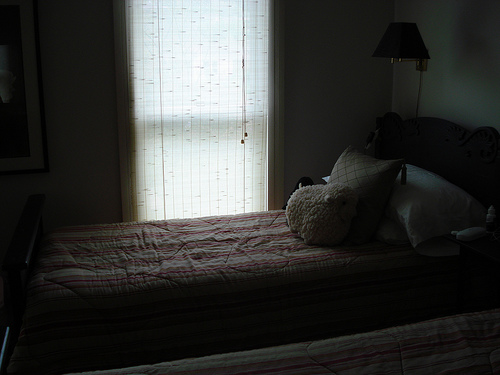FWP:
SETS == MIDPOINTS; WORDPLAY
BEKHUDI: {21,6}
As Nazm and Faruqi observe, this verse is a particularly brilliant network of sets of affinities. I'd like to add even more than those they mention. To take them in order:
='self-lessness'; 'my'; and 'me'
='bedding' (on bistar , see {194,1}); 'spreading out or arranging' [tamhiid];
rest [faraa;Gat]; 'bedchamber'
='introduction' [tamhiid]; and 'completion' [faraa;Gat]
='cessation, freedom' [faraa;Gat]; and 'filled, full' [pur]
='shadow'; and 'night'-chamber [shabistaa;N]
Since tamhiid participates in two such sets, and faraaGat in three, we have the subtle pleasure of watching them shift back and forth among their meanings, effortlessly changing gears as we redirect our attention. Even for Ghalib, this array of word- (and meaning- ) play is exceptional.
The speaker's bedchamber is filled with him the way a shadow is filled with him. Since a shadow isn't really substantial, isn't really 'filled' with anything, couldn't that also mean that he's not really in his bedchamber? If he's becoming self-less, perhaps he's not really anywhere? Perhaps the whole vision is a kind of dream?
Or could it be that his bedchamber is filled with him the way it itself is (also?) filled with shadow. That would be because he's so shadowy, so not-there, so pervasive and evasive and flimsy and protean and already thinning out into self-lessness.
Or could it be that he fills his bedchamber the way a 'shade' in the sense of a 'specter' or 'apparition' or other ghost visitor might fill it-- ominous, hovering, a last lingering reminder of another era of passionate vigils and nights of tossing and turning? Would the bedchamber uneasily sense his presence? Would it be waiting, hoping, for him to move on into another and fully 'self-less' world?
The real multiplier of possibilities is that 'midpoint' phrase saaye kii :tara;h , 'like a shadow' or 'like shadow', which can modify a number of different elements of the verse. Here are some of its possibilities:
=His bedchamber is filled with him in the manner that (a) shadow
is filled with him.
=His bedchamber is like (a) shadow in that both are filled with him.
=His bedchamber is filled with him the way it is filled with (a) shadow.
=His bedchamber is filled with him as if he is (a) shadow.
=His bedchamber filled with him is like (a) shadow.
(Note for grammar fans: Do you doubt that an adverbial phrase like saaye kii :tara;h can be taken to apply to the object of a postposition, 'me', rather than to the subject, the bedchamber? I don't blame you a bit, I had some doubt myself. To overcome it, consider the first line of the next verse, {190,7}.)
That second line! It lodges in my mind and won't go away. To me, it suffices all on its own to make this really a verse of mood. Of course, I don't know what it actually means, and all the cleverness of the commentators doesn't persuade me that they really know either. My own analytical efforts too feel somewhat beside the point; I can't put my heart into the kind of nuktah-chiin analysis that I usually enjoy. In this verse, the mood is too powerful. Maybe you feel it too, and you know what I mean. If you don't feel it, then there's no point in my going on and on; I don't think I can put it into words. It's just the penumbra of mystery: pur hai saaye kii :tara;h meraa shabistaa;N mujh se -- 'my night-chamber, like shadow, like a shadow, is filled with me'.
Note for grammar fans: For discussion of huujo , see {72,5}.

Nazm:
He says, may it be my fate for self-lessness to be the bedding of the preface of completion, for thanks to it, my bedchamber is filled with me the way a shadow is a flat/fallen [pur-uftaadah] thing. That is, it's a fine thing, whatever self-lessness has caused me to lie flat, senseless, like a shadow. The dictionary meaning of tamhiid is 'spreading', and and this is part of the affinities with 'bedding'. And as a term, they use it for expressing some ideas that come before some task, and upon which that task depends; and this is the meaning that the author intends-- that is, self-lessness is the 'preface' of the obtaining of completion/leisure. The dictionary meaning of faraa;Gat is 'to be empty', and this is part of the affinities with 'full'; and as a term it is used to mean 'rest, ease', and this is the meaning intended here. huujiyo is the established word; the late author has transformed and shortened it into huujo . (212-13)
== Nazm page 212; Nazm page 213